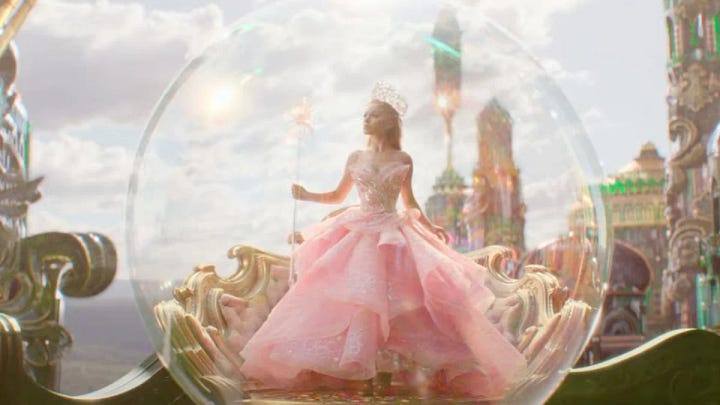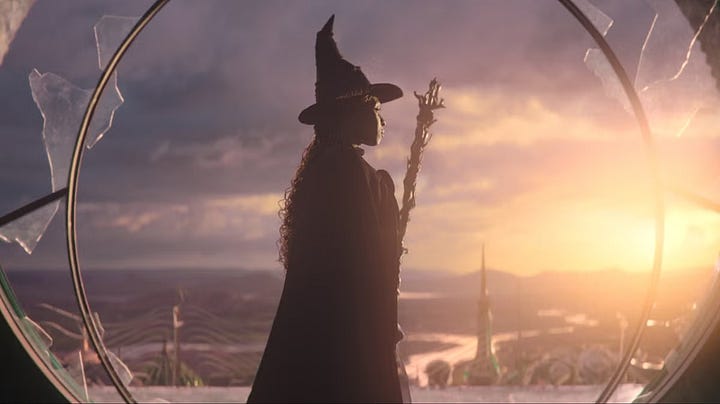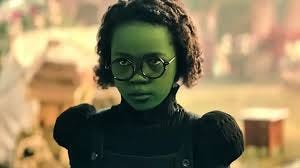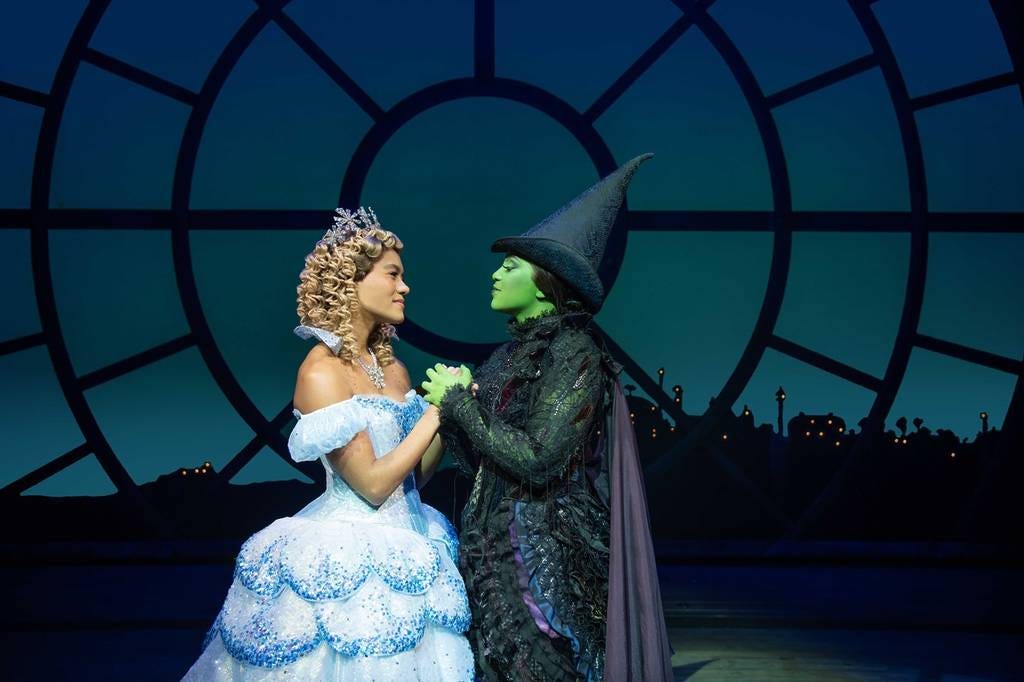Last week, we took a trip down memory lane to my little fundie childhood, where non-Christian music was dangerous, movie theaters were dens of sin, and Elphaba’s bravery rocked my world. We left off with me smirking at my Wizard (pastor) from California in quiet rebellion. Over the years, I’d see the Broadway Wicked at least 20 times. But I had no idea how its message would grow up along with me. The best stories always do.
Fast-forward to January 2025. A lot has changed. First off, movie theaters? Not Satan’s lair anymore. Oh, and I accidentally worked for (and quit) a weird Christian Nationalist group. No biggie. And now Wicked is a movie with Ariana Grande? No thank you, next.
But my husband wanted to go see it. So, I reluctantly got some popcorn and sat down in the once-forbidden cinema. I crossed my fingers and prayed to the theater gods that Hollywood didn’t turn my beloved broadway into a Nickelodeon after-school special.
As I watched, something happened that I wasn’t prepared for. My eyes didn’t just get watery to the point where I could pretend I had allergies. Tears poured. I tried to cover it by aggressively shoveling popcorn into my mouth. But I'm pretty sure the lady sitting next to me was reconsidering her life choices and plotting an exit strategy.
I felt all the big feelings when Elphaba jumped from the tower, saw her childhood reflection, and chose to soar. My entire view of her got flipped upside down. As a kid, I’d always seen Elphaba as this total badass woman. But now, as an adult, I see her as a brave little girl
The story was bigger than just rebellion. It’s a story about those pivotal, life-altering moments we all face when we decide whether to stay small or rise up.
Bishop Marienne Budde calls these decisive moments. Here’s a quote from her book How We Learn to Be Brave:
Decisive moments involve conscious choice, impressing their importance upon us as we experience them, for we know that we’re choosing a specific path of potential consequence. In a decisive moment. . .we no longer see ourselves as being acted upon by the slings and arrows of fortune or fate, but as ones with agency.
Elphaba and Glinda both had a very clear decisive moment. After they realize the Wizard is a fraud, he makes them each an offer in exchange for their silence. He entices Elphaba with power, and he offers Glinda a platform.
Glinda’s choice gets her places. She gets popularity, power, trust, and a glamorous traveling bubble. Elphaba’s choice doesn’t win her anything. It gets her completely outcast, name-called, and hunted.
To get rid of her, the Wizard and his PR crew decide to stir up the munchkin-mob. Tensions rise, rumors and monkeys fly, and the not-so-cute-anymore munchkins go on a witch hunt. Things get so bad that Elphaba has to fake her death and leave Oz forever. And who helps her do it? Glinda.
The play ends with their emotional goodbye. On the surface, we see two friends, holding hands, thanking each other for how they’ve changed each others’ lives. And every time I’ve been in the audience, I hear the sound of sniffles echo across the theater.
But this January—I felt a heavier sadness settle over the crowd who’d all just spent holidays with family (or not) after a tense election season. One layer deeper, we see two best friends. Clinging to each other. Losing each other. Torn apart by political lies. All because Glinda didn’t have the guts to tell the truth.
Their emotional goodbye reflects something we all feel deep in our bodies—our primal, human need for tribal acceptance and the lengths we will often go to get it. I think that’s the real, raw emotion behind our tears. Because while we all would totally say we’re brave like Elphaba, our nervous systems tell the truth. Most of us are cowards like Glinda. We’d trade truth for acceptance in a heartbeat. Because being a fraud with friends is easier than being honest alone.
In the end, when Glinda looks into Elphaba’s eyes, she is forced to reckon with the truth:
Who can say if I've been changed for the better?
But because I knew you
I have been changed for good.
So, I guess she did have the guts to say it. But only when no one was around to hear it. Only when her pretty pink charicature wasn’t at risk. Only after she’d secured the magic wand, the popularity, the bubble.
Here’s the thing. It’s really hard to call each other wicked when we look into each other’s eyes and remember that we’re not enemies. When we take each other’s hands in our own. When we dare to believe that people are good and that we all need each other.
On a larger scale, Wicked exposes an uncomfortable concept: If our idea of goodness is based on lies, then the truth will feel like wickedness.
What starts as a fairytale soon feels like a mirror, reflecting the way leaders twist morality to serve their own agenda. Like the Wizard, powerful people will always call good things wicked in order to win allegiance.
Sound familiar? If Elphaba were real today, her name would be Empathy. And Christians would be trying to kill her.
Well-known Christians and politicians are working overtime to frame empathy as a sin. It’s laughable at first, until we realize they’re serious. Just watch this video of Christian Nationalist Pastor Josh McPherson.
Books on this topic are becoming popular. Like The Sin of Empathy by Joe Rigney, and Toxic Empathy by Allie Beth Stuckey. They ironically teach American evangelical Christians how to be less empathetic.
But here’s the thing: the truth doesn’t lose its power just because it’s labeled as wicked. Empathy doesn’t lose its strength because some podcasters with microphones decide to rebrand it and profit off the book royalties.
Like the characters in Wicked, we are losing each other to labels, lies, and loud voices. So let’s ditch the munchkin-mob and get back to reality.
Elphaba wasn’t wicked. Empathy isn’t a sin. And unlike Glinda, good people need to speak up before it’s too late. Before we lose each other for good.
Don’t just nod along with the Wicked soundtrack and ignore its message. Learn from it. Try to make friends with those who are being labeled “wicked.” They won’t cast a spell on you, I promise. And they won’t stop existing just because someone throws a bucket of water (or executive orders) at them.
This is a decisive moment. It’s time to question the powerful people and groups who are offering us a sense of belonging—just like the Wizard did for both Glinda and Elphaba.
And like them, you get to choose: Bubble? Or Freedom?






“If our idea of goodness is based on lies, then the truth will feel like wickedness.”
A. WORD. I deeply resonate with everything you said here. Thanks for writing.